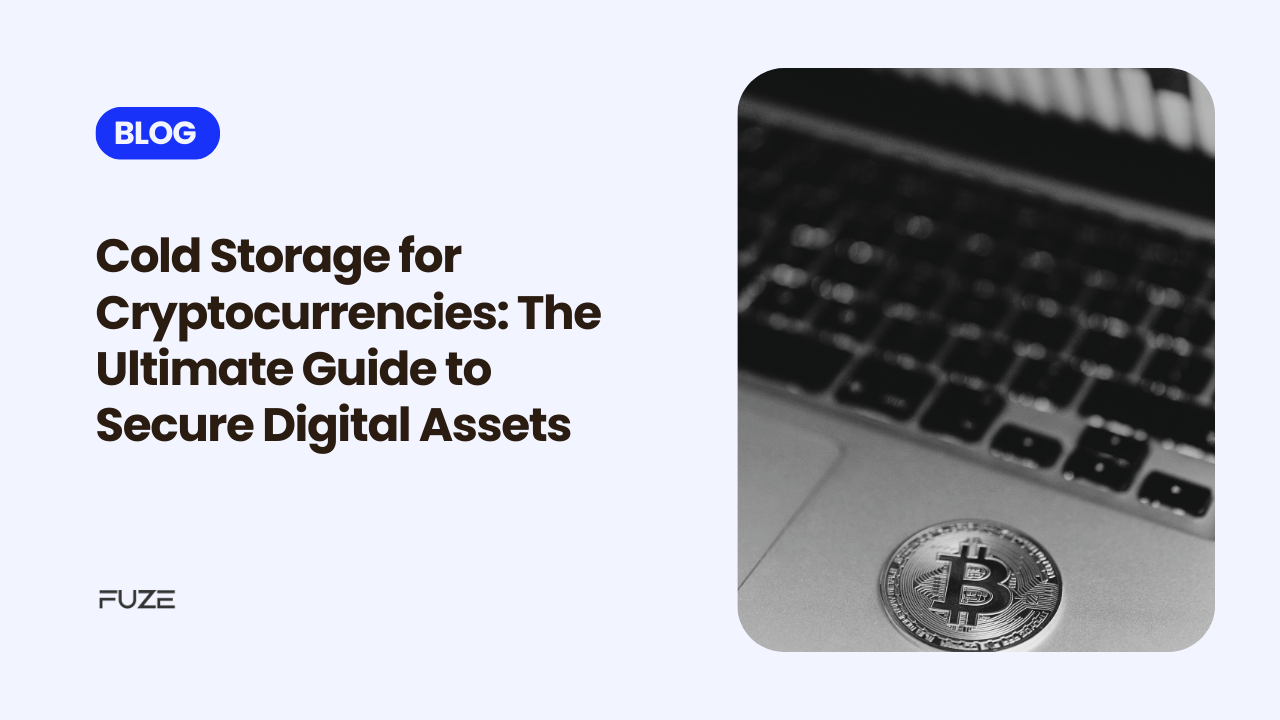Cryptocurrencies have revolutionised the way we think about digital finance, offering an innovative, decentralised alternative to traditional banking systems. However, with this innovation comes the responsibility of safeguarding digital assets. As cryptocurrencies become more valuable and widely adopted, securing them is paramount. One of the most reliable methods of securing digital assets is cold storage for crypto, which offers an added layer of protection against theft, hacking, and other risks associated with digital currency ownership.
In this guide, we will explore what cold storage is, why it’s essential for crypto security, and how businesses can leverage this method to protect their valuable assets. We will also dive into the different types of cold storage options available and how Fuze’s secure solutions can help ensure the safety of your cryptocurrencies.
What is Cold Storage and Why is it Essential for Crypto Security?
Cold storage refers to the practice of keeping cryptocurrencies offline, disconnected from the internet or air gapped, to protect them from online threats like hacking, phishing, and other cyberattacks. Unlike “hot wallets,” which are connected to the internet and constantly exposed to potential vulnerabilities, cold storage is completely offline, making it much harder for hackers to access the stored assets.
The essential advantage of cold storage is that it provides an additional layer of security by removing digital assets from online environments where cybercriminals typically operate. For businesses and investors, cold storage is a critical component of a comprehensive crypto security strategy, as it minimises the risks of wallet hacks, exchange breaches, and other forms of online theft. Since cryptocurrencies are decentralised and transactions are irreversible, once assets are stolen, they are usually gone forever. Cold storage significantly mitigates this risk by ensuring that access to the funds requires physical access to the storage device or document.
Benefits of Using Cold Storage for Cryptocurrencies
- Enhanced Security – The primary benefit of cold storage is the superior security it offers. By storing cryptocurrencies offline, you drastically reduce the risk of online threats, such as hacking or phishing scams. Cold storage protects assets from the vulnerabilities that come with being connected to the internet.
- Protection Against Exchange Hacks – Many cryptocurrency platforms have been victims of high-profile hacks in recent years. With cold storage, you are not relying on a third-party platform to safeguard your assets, significantly reducing the potential loss due to exchange breaches.
- Long-Term Storage for Investors – Cold storage is ideal for long-term cryptocurrency users who plan to hold their assets for an extended period. By keeping crypto offline, investors ensure that their assets are safe from market volatility and online threats, making it a stable and secure solution for those not actively trading.
- Control and Ownership – With cold storage, the private keys to your crypto assets are under your control. Unlike hot wallets or exchanges, where you trust third parties with your keys, cold storage ensures that you have full ownership of your assets, minimising the risk of third-party errors or fraudulent activities.
- Reduced Risk of Human Error – Since cold storage typically involves physical devices or documents, it reduces the chances of human error, such as accidental exposure of private keys or unauthorised transactions. This makes it an ideal solution for businesses who prioritise control and accuracy over convenience.
Cold Storage vs. Hot Wallets: Key Differences
When discussing cold storage for crypto, it’s important to compare it to hot wallets, as both are commonly used methods for storing digital assets. While each has its own advantages, understanding their key differences can help determine the best option for your needs.
| Feature | Cold Storage | Hot Wallets |
| Connectivity | Offline: Cold storage keeps crypto assets disconnected from the internet. | Online: Hot wallets are internet-connected, making assets easier to access. |
| Security Level | More Secure: Cold storage is highly resistant to hacking attempts and malware. | Higher Risk: Hot wallets are more vulnerable to hacking, phishing, and malware attacks. |
| Use Case | Best for Long-Term Storage: Ideal for holding assets for long periods without frequent access. | Best for Active Trading: Suitable for users needing frequent access to funds. |
| Access Requirements | Requires Physical Access: Access requires a physical device like a hardware or paper wallet. | Convenient: No physical device needed, offering quick access for daily transactions. |
| Ideal Users | Long-term holders and those prioritising maximum security over ease of access. | Active traders and businesses needing frequent access to funds, with a tolerance for risk. |
While hot wallets are perfect for fast, day-to-day transactions and active trading, cold storage is the recommended choice for securing significant holdings, long-term investments, and funds not required for immediate use.
Types of Cold Storage: Hardware Wallets and Paper Wallets
There are two primary types of cold storage for crypto: hardware wallets and paper wallets. Both methods ensure offline storage but differ in how they are used and their level of security.
Hardware Wallets
Hardware wallets are physical devices designed to securely store cryptocurrency private keys offline. These wallets come with built-in security features, such as PIN codes, passphrase protection, and backup phrases, ensuring the safety of digital assets even if the device is lost or stolen.
- How it works: When you want to make a transaction, you connect the hardware wallet to a computer or mobile device, sign the transaction offline, and then transmit it online. The private keys never leave the device, minimising exposure to online risks.
- Examples: Popular hardware wallets include Trezor, Ledger Nano S, and Ledger Nano X.
Advantages of Hardware Wallets:
- Highly secure and resistant to malware and online threats.
- Physical device offers an extra layer of protection from unauthorised access.
- Convenient for regular but secure access to funds.
Paper Wallets
A paper wallet is a physical printout of your cryptocurrency’s private and public keys, often in the form of a QR code. Paper wallets are a form of cold storage that offers an extremely high level of security as they are completely offline and immune to online hacking.
- How it works: Paper wallets are generated using a secure offline computer, and the private keys are printed on paper. To use the wallet, the public key is scanned, and the transaction is signed with the private key stored offline.
- Examples: Paper wallets can be created through various online tools, such as BitAddress.org or MyEtherWallet.
Advantages of Paper Wallets:
- Completely offline and immune to hacking.
- No need for special hardware or devices.
- Can be stored in a secure physical location (e.g., a safe).
Challenges of Paper Wallets:
- Paper can be lost or damaged, making it difficult to recover funds.
- Not ideal for frequent access or transactions.
- Requires careful handling and storage to ensure security.
Best Practices for Storing Digital Assets Offline
- Use Multiple Backups – Store multiple copies of private keys in different secure locations. This reduces the risk of losing access due to physical damage or loss.
- Secure Wallets in Safe Locations – Store paper wallets in safes or vaults, and keep hardware wallets in protected, secure environments to guard against theft or physical damage.
- Encrypt and Use Strong Passphrases – Encrypt any backup copies and use robust passphrases to ensure that unauthorised access is minimised.
- Distribute Storage Locations – Avoid keeping all cold storage devices or documents in one place. Spread them across various secure locations to protect against loss due to theft or natural disasters.
- Regularly Test Cold Storage Access – Periodically verify that you can access funds and back up wallets to ensure everything is functioning as expected.
- Limit Access to Authorised Personnel Only – Restrict access to cold storage devices or private keys to trusted individuals and implement strict access controls to prevent internal security breaches.
Conclusion
Cold storage for crypto is an essential solution for businesses aiming to secure digital assets, especially as the value of cryptocurrencies continues to rise. Whether using hardware wallets, paper wallets, or a combination of both, storing assets offline significantly reduces the risk of hacking and fraud. By following best practices and leveraging Fuze’s secure solutions, companies can ensure long-term protection of their digital assets, confidently safeguarding their holdings against evolving cyber threats.
Disclaimer: Virtual assets carry significant risks, including high volatility and potential loss of your entire investment. They are not backed by governmental protections, and recourse may be limited in case of loss. Always assess your risk tolerance, fully understand the risks, and seek independent financial advice if needed before investing.
Frequently Asked Questions
1. Why is cold storage essential for securing business-owned digital assets?
Cold storage provides an added layer of protection by keeping assets offline, safeguarding them against online threats like hacking and phishing. For businesses with long-term crypto holdings, cold storage reduces risks of theft and fraud, ensuring that assets are accessible only through physical means.
2. Which businesses should consider using cold storage?
Businesses with significant crypto holdings, long-term investment strategies, or security-focused operations should consider cold storage. It’s particularly beneficial for companies that prioritise security over frequent access to their digital assets.
3. Can businesses combine cold storage with hot wallets for flexibility and security?
Yes, businesses can use a combination of cold storage for long-term holdings and hot wallets for day-to-day transactions. This approach provides accessibility for active trading while keeping primary assets secure offline.
4. What are the potential risks associated with using paper wallets for cold storage?
Paper wallets, while secure, can be susceptible to physical damage (e.g., water, fire) or loss. Businesses using paper wallets should store them in safe, protected locations and create multiple copies for redundancy.
5. Is cold storage suitable for companies engaged in frequent crypto transactions?
Cold storage is best suited for long-term storage of digital assets. Companies with frequent transaction needs may use hot wallets for daily access but can keep larger holdings in cold storage to balance accessibility with security.







